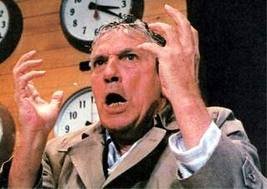- Do young people know the difference between the two?
 I was recently invited to give a talk at a business conference designed to help high school seniors in our county who have an interest in pursuing a business career. Specifically, I was assigned two sessions to describe what the young person should expect as they make the transition to adult life, which was based in large part on my book, "MORPHING INTO THE REAL WORLD - A Handbook for Entering the Work Force."
I was recently invited to give a talk at a business conference designed to help high school seniors in our county who have an interest in pursuing a business career. Specifically, I was assigned two sessions to describe what the young person should expect as they make the transition to adult life, which was based in large part on my book, "MORPHING INTO THE REAL WORLD - A Handbook for Entering the Work Force."
I wore a suit and tie for the occasion to express my credibility and out of respect for my audience, even though none were older than eighteen years of age. This was going to be an unusual talk for me as I normally address adults, not youth. Because of this, I wanted to know a little about my audience. So, using a show of hands, I inquired where the students were from, such as their high schools, but I also flippantly asked how many were capitalists and, conversely, if there were any socialists present. I received a lot of blank stares on both accounts. This caused me to deviate from my planned program and deliver a mini-dissertation describing the differences. I contended in order to be successful in business, the students would be wise to know what each meant.
Interestingly, some were brainwashed into believing capitalism was evil and simply represented another form of greed. I contend greed is a human emotion, and can be equally applied under either system. Therefore, capitalism is not greed, it is a celebration of the individual's right to try and succeed. Whereas capitalism focuses on the rights of the individual, socialism concentrates on the rights of the group overall.
I explained, under capitalism the individual has the right to try his/her hand at anything they are so inclined, thereby representing freedom. They simply have the right to try, nothing more, nothing less. If they are lucky, they may succeed, but they also run the risk of failure. Failure is an inherent and important part of the system. There are no guarantees for success. This is why risk is important, to force the individual to work harder and smarter to avoid defeat. As such, capitalism encourages entrepreneurship (innovation and invention). If the person is successful, they are entitled to enjoy the fruits of their labor. If they are not, they must suffer defeat. This should force the person to redouble his/her efforts and try again which, of course, is evolution in action.
To encourage entrepreneurship, our founding fathers took steps to safeguard the intellectual property of the individual. This specifically includes Article 1, Section 8 of the United States Constitution, wherein the powers of Congress are defined. It states, in part, "The Congress shall have Power ... To promote the Progress of Science and useful Arts, by securing for limited Times to Authors and Inventors the exclusive Right to their respective Writings and Discoveries;". This led to such institutions as the Patent and Copyright offices which were specifically designed to safeguard an individual's intellectual property. As early as 1790, the first patent and copyright were approved. At the time, safeguarding intellectual property in this manner was rare to the rest of the world. By promoting the entrepreneurial rights of the individual, our forefathers were embracing capitalism.
As mentioned, the focus in Socialism in on the group, not the individual. Here, the rights of the many take priority over the individual. Because of this, personal initiative is discouraged and the individual cannot endeavor to do better than the next person, and failure is prohibited; the group will always bail you out. There is no notion of assuming risk and being held personally accountable for your actions. All compensation is equitable among workers with no rewards for outstanding achievement or penalties for inferior workmanship. Intellectual property belongs to the group, not the individual. Consequently, this approach discourages entrepreneurship and tends to promote apathy.
The Achilles' heel of Socialism is the belief everyone is equal and, as such, should be treated and compensated on an equitable basis. On the surface, this sounds like a fair and noble notion. The assumption though is everyone works at the same level of effort and expertise which, of course, is simply not so. Restraining the individual from achieving higher levels of workmanship or striving for higher goals is unnatural and discourages the worker.
To summarize:
FOCUS -
Capitalism: The rights of the individual; the right to "try"; requires freedom.
Socialism: The rights of the group; collective decision making; regulations restrain the individual.
Capitalism: The rights of the individual; the right to "try"; requires freedom.
Socialism: The rights of the group; collective decision making; regulations restrain the individual.
ENTREPRENEURSHIP -
Capitalism: Yes, encourages risk; enjoys fruits of labor; individual assumes personal responsibility; promotes evolution.
Socialism: No, discourages risk; individual cannot fail; encourages apathy, discourages change; unnatural.
Capitalism: Yes, encourages risk; enjoys fruits of labor; individual assumes personal responsibility; promotes evolution.
Socialism: No, discourages risk; individual cannot fail; encourages apathy, discourages change; unnatural.
INTELLECTUAL PROPERTY -
Capitalism: Yes, belongs to the individual.
Socialism: No, property belongs to the group.
Capitalism: Yes, belongs to the individual.
Socialism: No, property belongs to the group.
Before closing my talk, I encouraged the students to become familiar with the works of author Ayn Rand, particularly "The Fountainhead" (1943) and "Atlas Shrugged" (1957). Rand's work touted the need for individual achievement and capitalism, and saw them as two intertwined concepts.
In business, we have to be mindful of encouraging individual achievement and teamwork equally. We realize our team is as good as its weakest player, hence the need to encourage workers to strive harder for perfection. However, there will always be those people who will rise above others and it certainly wouldn't make sense to impede their growth.
"But you say that money is made by the strong at the expense of the weak? What strength do you mean? It is not the strength of guns or muscles. Wealth is the product of man's capacity to think. Then is money made by the man who invents a motor at the expense of those who did not invent it? Is money made by the intelligent at the expense of the fools? By the able at the expense of the incompetent? By the ambitious at the expense of the lazy? Money is made--before it can be looted or mooched--made by the effort of every honest man, each to the extent of his ability. An honest man is one who knows that he can't consume more than he has produced."
- Ayn Rand
- Ayn Rand
UPDATE: IS AMERICA A SOCIALIST STATE?
America may not have embraced Socialism as fervently as Cuba, China, North Korea, Viet Nam, or the old USSR, but make no mistake, America has been moving in a Socialist direction for quite some time. Whereas, the country used to embrace capitalism, and was repulsed by the very idea of socialism, now we are just as tolerant of it as marijuana. Young people today are more amenable to accepting it, probably because they were never taught what it was in school. Liberals market it as "equality for all," while conservatives perceive it as repressive slavery.
Seventy five years ago I would have described the country as 75% capitalist, and 25% socialist. Today, I believe it is just the opposite. Socialism has been in the country since the 1820's, but was not widely embraced until the country was faced with the Great Depression and had to rethink its economic policies under Franklin D. Roosevelt. FDR's social programs may have been noble in intent, but did not eradicate the problem. Only World War II brought America out of it. FDR's legacy was continued by Kennedy, Johnson, Carter, Clinton, and now Obama. It is manifested by labor unions, welfare entitlements, economic bailouts, and handouts to friendly countries around the globe, some for humanitarian reasons, others as a bribe.
Today, approximately one third of the country is on some federally subsidized program. This includes illegal immigration. Another one third is paying not only for their own family, but those on welfare as well.
318.9M - people in America
109.6M - on welfare
109.6M - on welfare
58.7% - pay income tax
43.3% - do not
43.3% - do not
The socialist way of paying for entitlements is through heavy taxation, including personal, corporate, and foreign. The capitalist way is to reduce tax rates, stimulate the economy, and put more people to work.
Socialism represents a redistribution of the wealth. When you hear politicians say, "free education," "free health care," and "free" everything else, without having a way to earn it yourself, that is the voice of slavery, not freedom. This explains why the federal debt is so high.
So, Yes, I believe the country is at least 75% socialist and 25% capitalist. It also appears the Democratic Party has turned socialist. Even DNC Chairman, Cong. Debbie Wasserman Schultz, cannot discern the difference. Further, there is the distinct possibility the Democrats will elect Senator Bernie Sanders, an admitted Socialist, as their candidate for president. The only difference between Sanders, and the other Democratic candidates, is Sanders is honest about his position, the others are not.
First section originally published: November 28, 2012
Keep the Faith!
Note: All trademarks both marked and unmarked belong to their respective companies.
 Tim Bryce is a writer and the Managing Director of M&JB Investment Company (M&JB) of Palm Harbor, Florida and has over 30 years of experience in the management consulting field. He can be reached at timb001@phmainstreet.com
Tim Bryce is a writer and the Managing Director of M&JB Investment Company (M&JB) of Palm Harbor, Florida and has over 30 years of experience in the management consulting field. He can be reached at timb001@phmainstreet.com
For Tim's columns, see: timbryce.com
Like the article? TELL A FRIEND.
Copyright © 2015 by Tim Bryce. All rights reserved.
NEXT UP: WHEN HAVOC STRIKES- What to do when someone loses their cool at the office.
LAST TIME: MANAGING COMPLEXITY - It's really not difficult as long as we use a little common sense.
Listen to Tim on WJTN-AM (News Talk 1240) "The Town Square" with host John Siggins (Mon, Wed, Fri, 12:30-3:00pm Eastern); WZIG-FM (104.1) in Palm Harbor,FL; and KIT-AM 1280 in Yakima, Washington "The Morning News" with hosts Dave Ettl & Lance Tormey (weekdays. 6:00-9:00am Pacific). Or tune-in to Tim's channel on YouTube.
 In a recent Information Technology discussion group I am involved with, someone posed the question, "What is complexity?" I was surprised by the question as I thought it was understood what complexity was all about. Evidently not. The person posing the question was primarily concerned with complexity in system design, but I think it goes beyond systems, to all facets of business, be it related to products or services.
In a recent Information Technology discussion group I am involved with, someone posed the question, "What is complexity?" I was surprised by the question as I thought it was understood what complexity was all about. Evidently not. The person posing the question was primarily concerned with complexity in system design, but I think it goes beyond systems, to all facets of business, be it related to products or services. One thing young people are not very cognizant of is their personal record, particularly teenagers. Whether or not we ever see it, we all have a record that follows us from birth and well beyond death. It hovers above us like a vulture shadowing its prey. Make no mistake, it is always there tracking our every move, and I believe this is what young people do not comprehend.
One thing young people are not very cognizant of is their personal record, particularly teenagers. Whether or not we ever see it, we all have a record that follows us from birth and well beyond death. It hovers above us like a vulture shadowing its prey. Make no mistake, it is always there tracking our every move, and I believe this is what young people do not comprehend. It had been three years since Joshua Steivenson's father passed away, yet the son was still cleaning out his father's belongings. The old wooden house in Buffalo, New York was built in the 1930's. Years ago, the cellar included an ancient coal furnace and chute, typical for the time. His father, Millard, converted it to a gas furnace a few decades ago in order to develop a clean and quiet place to study. His mother, who still maintained the house, encouraged Joshua to clean up his father's belongings as she did not want to deal with it anymore. Everything in the cellar was tidy, which is uncharacteristic of a mathematician, but his voluminous books and notes filled shelf after shelf. Joshua had cleaned up the attic and his father's closets upstairs, but it was now the cellar's turn for attention. He had looked forward to pouring through his father's notes, as he remembered the amount of effort and detail the elder devoted to them.
It had been three years since Joshua Steivenson's father passed away, yet the son was still cleaning out his father's belongings. The old wooden house in Buffalo, New York was built in the 1930's. Years ago, the cellar included an ancient coal furnace and chute, typical for the time. His father, Millard, converted it to a gas furnace a few decades ago in order to develop a clean and quiet place to study. His mother, who still maintained the house, encouraged Joshua to clean up his father's belongings as she did not want to deal with it anymore. Everything in the cellar was tidy, which is uncharacteristic of a mathematician, but his voluminous books and notes filled shelf after shelf. Joshua had cleaned up the attic and his father's closets upstairs, but it was now the cellar's turn for attention. He had looked forward to pouring through his father's notes, as he remembered the amount of effort and detail the elder devoted to them. Years ago it was commonplace to give job referrals for employees or professional acquaintances. For example, 30 years ago when we moved from Cincinnati to Tampa, for those employees who elected to stay behind and not make the move, we openly helped them locate new jobs. We had several contacts in the systems industry and were able to help our people find work. This was not unusual at the time, but I'm afraid you do not see such practices anymore, nor do I recommend giving such referrals anymore as this has become a potentially litigious problem. For example, if you give a positive endorsement, and the worker doesn't perform to the satisfaction of the new employer, the company may elect to sue you for misrepresenting the worker. On the other hand, if you give a negative endorsement, the individual in question may sue you over defamation of character. In other words, it's a "lose-lose" proposition no matter what you do.
Years ago it was commonplace to give job referrals for employees or professional acquaintances. For example, 30 years ago when we moved from Cincinnati to Tampa, for those employees who elected to stay behind and not make the move, we openly helped them locate new jobs. We had several contacts in the systems industry and were able to help our people find work. This was not unusual at the time, but I'm afraid you do not see such practices anymore, nor do I recommend giving such referrals anymore as this has become a potentially litigious problem. For example, if you give a positive endorsement, and the worker doesn't perform to the satisfaction of the new employer, the company may elect to sue you for misrepresenting the worker. On the other hand, if you give a negative endorsement, the individual in question may sue you over defamation of character. In other words, it's a "lose-lose" proposition no matter what you do. There is a general stereotype of senior citizens in this country whereby they are commonly described as either mean, cantankerous, grumpy, crotchety, irritable, impatient, sour, aloof or acerbic. There are reasons for this, most of which are caused by changing physical conditions. Allow me to explain.
There is a general stereotype of senior citizens in this country whereby they are commonly described as either mean, cantankerous, grumpy, crotchety, irritable, impatient, sour, aloof or acerbic. There are reasons for this, most of which are caused by changing physical conditions. Allow me to explain. For as long as I can remember, people in the Information Technology business have enjoyed relative immunity from being fired from their job. This is primarily because when they write source code (text which is compiled into electronic format) it is difficult to read and understand the logic behind it. In most cases, if a programmer has written a program featuring a special calculation or feature, employers are afraid to release the person as they fear the logic will walk out the door with the person, making maintenance or modification of the source code almost impossible. This can be easily overcome by developing documentation, both within the program using comments, and externally where the purpose, description, and logic of the program is explained, as well as its interfaces to other programs and file structures. Unfortunately this rarely occurs as programmers stubbornly resist writing documentation in fear someone might read it and criticize their work. By doing so, they have safeguarded their job and now hold it hostage.
For as long as I can remember, people in the Information Technology business have enjoyed relative immunity from being fired from their job. This is primarily because when they write source code (text which is compiled into electronic format) it is difficult to read and understand the logic behind it. In most cases, if a programmer has written a program featuring a special calculation or feature, employers are afraid to release the person as they fear the logic will walk out the door with the person, making maintenance or modification of the source code almost impossible. This can be easily overcome by developing documentation, both within the program using comments, and externally where the purpose, description, and logic of the program is explained, as well as its interfaces to other programs and file structures. Unfortunately this rarely occurs as programmers stubbornly resist writing documentation in fear someone might read it and criticize their work. By doing so, they have safeguarded their job and now hold it hostage.
 I have a friend who contends there is no real management going on in business anymore. She argues people are just playing with numbers and not trying to manage their way to success. To illustrate, I have another friend who is a manager of a popular restaurant franchise. I asked him how he manages his people. Interestingly, it is based on such things as sales volume, tips, and satisfaction surveys, which play a major role. From this, a score is computed and the waiters and waitresses are ranked accordingly. These scores ultimately dictate who will be assigned the best serving rotations in the restaurant. Other than this, he does little else in terms of managing his people, and it appears that's how corporate likes it. Interestingly, he also commented to me there was a lack of team spirit by his people; "Nobody watches the back of another," he said with dismay.
I have a friend who contends there is no real management going on in business anymore. She argues people are just playing with numbers and not trying to manage their way to success. To illustrate, I have another friend who is a manager of a popular restaurant franchise. I asked him how he manages his people. Interestingly, it is based on such things as sales volume, tips, and satisfaction surveys, which play a major role. From this, a score is computed and the waiters and waitresses are ranked accordingly. These scores ultimately dictate who will be assigned the best serving rotations in the restaurant. Other than this, he does little else in terms of managing his people, and it appears that's how corporate likes it. Interestingly, he also commented to me there was a lack of team spirit by his people; "Nobody watches the back of another," he said with dismay.
 There have been a handful of epochal events over the years where someone might ask, "Where were you when this or that happened?" For example, Pearl Harbor, the JFK assassination, the Beatles on Ed Sullivan, Neal Armstrong setting foot on the moon, and the Challenger disaster. Of course, the most recent event to Americans was the 9-11 terrorist attack in 2001. As for me, I was in my office early on that Tuesday morning and my cleaning crew was in taking care of the office. In the reception area, I had a television turned on and tuned to the local news. As I was typing on my computer, one of the cleaning crew came into my office very excited and said, "Tim, come out here and look at this; they've attacked the Twin Towers in New York." I rushed out and watched the north tower burning and listened to newscasters hustling to get on top of the story. Then, after a few minutes, a second plane crashed into the south tower. We couldn't believe our eyes. This was compounded later by air attacks on the Pentagon in Washington, DC, and another plane crashing in western Pennsylvania.
There have been a handful of epochal events over the years where someone might ask, "Where were you when this or that happened?" For example, Pearl Harbor, the JFK assassination, the Beatles on Ed Sullivan, Neal Armstrong setting foot on the moon, and the Challenger disaster. Of course, the most recent event to Americans was the 9-11 terrorist attack in 2001. As for me, I was in my office early on that Tuesday morning and my cleaning crew was in taking care of the office. In the reception area, I had a television turned on and tuned to the local news. As I was typing on my computer, one of the cleaning crew came into my office very excited and said, "Tim, come out here and look at this; they've attacked the Twin Towers in New York." I rushed out and watched the north tower burning and listened to newscasters hustling to get on top of the story. Then, after a few minutes, a second plane crashed into the south tower. We couldn't believe our eyes. This was compounded later by air attacks on the Pentagon in Washington, DC, and another plane crashing in western Pennsylvania. If Donald Trump contributed anything to the political process during this presidential election, he has called the American voter to arms over our dysfunctional government. People are mad as hell about such things as:
If Donald Trump contributed anything to the political process during this presidential election, he has called the American voter to arms over our dysfunctional government. People are mad as hell about such things as: